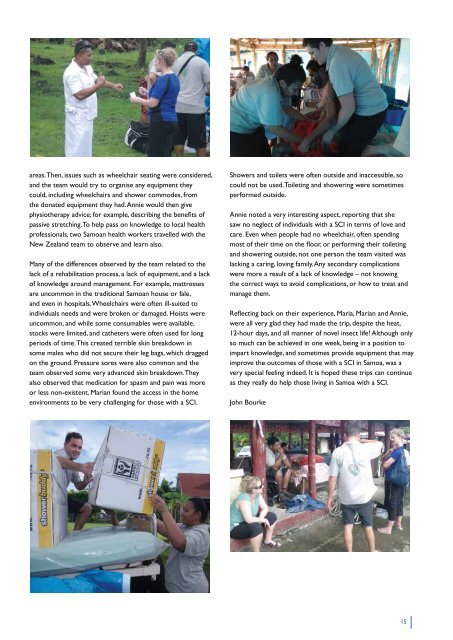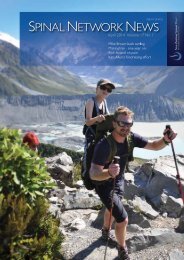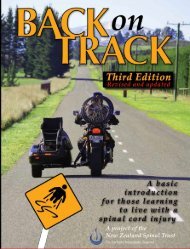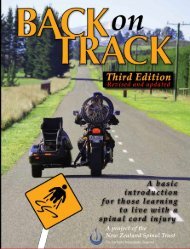SPINAL NETWORK NEWS
You also want an ePaper? Increase the reach of your titles
YUMPU automatically turns print PDFs into web optimized ePapers that Google loves.
areas. Then, issues such as wheelchair seating were considered,<br />
and the team would try to organise any equipment they<br />
could, including wheelchairs and shower commodes, from<br />
the donated equipment they had. Annie would then give<br />
physiotherapy advice; for example, describing the benefits of<br />
passive stretching. To help pass on knowledge to local health<br />
professionals, two Samoan health workers travelled with the<br />
New Zealand team to observe and learn also.<br />
Many of the differences observed by the team related to the<br />
lack of a rehabilitation process, a lack of equipment, and a lack<br />
of knowledge around management. For example, mattresses<br />
are uncommon in the traditional Samoan house or fale,<br />
and even in hospitals. Wheelchairs were often ill-suited to<br />
individuals needs and were broken or damaged. Hoists were<br />
uncommon, and while some consumables were available,<br />
stocks were limited, and catheters were often used for long<br />
periods of time. This created terrible skin breakdown in<br />
some males who did not secure their leg bags, which dragged<br />
on the ground. Pressure sores were also common and the<br />
team observed some very advanced skin breakdown. They<br />
also observed that medication for spasm and pain was more<br />
or less non-existent. Marian found the access in the home<br />
environments to be very challenging for those with a SCI.<br />
Showers and toilets were often outside and inaccessible, so<br />
could not be used. Toileting and showering were sometimes<br />
performed outside.<br />
Annie noted a very interesting aspect, reporting that she<br />
saw no neglect of individuals with a SCI in terms of love and<br />
care. Even when people had no wheelchair, often spending<br />
most of their time on the floor, or performing their toileting<br />
and showering outside, not one person the team visited was<br />
lacking a caring, loving family. Any secondary complications<br />
were more a result of a lack of knowledge – not knowing<br />
the correct ways to avoid complications, or how to treat and<br />
manage them.<br />
Reflecting back on their experience, Maria, Marian and Annie,<br />
were all very glad they had made the trip, despite the heat,<br />
12-hour days, and all manner of novel insect life! Although only<br />
so much can be achieved in one week, being in a position to<br />
impart knowledge, and sometimes provide equipment that may<br />
improve the outcomes of those with a SCI in Samoa, was a<br />
very special feeling indeed. It is hoped these trips can continue<br />
as they really do help those living in Samoa with a SCI.<br />
John Bourke<br />
15
















